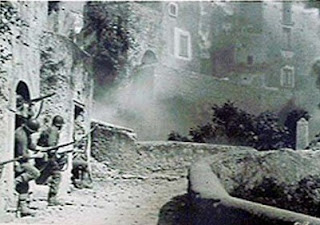It was one of Columbia's major productions of 1963 - a three-hour (plus intermission) roadshow production for which the studio harbored Oscar fantasies. The studio's other big Oscar bid was Otto Preminger's equally sprawling "The Cardinal." But while "The Cardinal" has surfaced on VHS, Laser and DVD, "The Victors" continues to sit on some shelf at Sony.
Neglected.
But Wait! "The Victors" will be showing in a new print and in its full version at the Film Society of Lincoln Center at 8 p.m. on Monday, 1 March. Is it possible, just possible that, at long last, a DVD release will follow? (Apparently, Sony has already released one in the UK.) Let's hope so.

Shot in widescreen and black-&-white by Christopher Challis and boasting a huge international cast, "The Victors" works essentially as a series of short stories about the various members of an infantry squad as it treks from Sicily to Germany during the final weeks of World War II, crosscutting their interpersonal relationships with those they share with the enemy and with assorted women. Foreman, who wrote his own script, keeps his film big and hulking while also managing to concentrate on the human interest in his vignettes.
Peter Fonda, for example, pops up as a soldier obsessed with saving a puppy from the ravages of war; George Hamilton is a G.I. disillusioned when the woman he falls for - played by Romy Schneider - becomes a prostitute; Eli Wallach plays a harsh sergeant who has his face blown off in combat and, in the finale, Albert Finney appears as a drunken Russian soldier whose face-to-face encounter with the disgusted Hamilton neatly sums up the insanity of war.
The best moment in the film, for my money, is the stark sequence when a young American deserter is executed in the snow while Frank Sinatra's "Have Yourself a Merry Little Christmas" plays in the background.
There's more, but I haven't been able to see the film in years and it is quickly disappearing from my mind. Thank God for Lincoln Center.
As a writer, Foreman worked largely with producer-director Stanley Kramer, penning both including "Home of the Brave" (1949) and "The Men" (1950). His last film in tandem with Kramer would be the Fred Zinnemann-directed "High Noon" (1952), whose release coincided with Foreman's "hostile" testimony before the House UnAmerican Activities Committee. His refusal to cooperate ultimately led to his blacklisting.

Foreman would continue to write movies, using assorted pseudonyms (including Derek Frye) and often without taking credit at all. It was pretty much known that he wrote the screenplay for David Lean's 1957 Oscar-winning "The Bridge on the River Kwai," although credit would go to Pierre Boule, the French author who wrote the novel upon which "Kawi" was based. Boule subsequently took home the Oscar for Best Screenplay, although the Academy would honor Foreman for his contribution in 1985, following his death from brain cancer the year before.
As a producer, Forman was responsible for such fine films as "Born Free," "Young Winston" and, best of all, John Dexter's 1970 "The Virgin Soldiers," another vivid (and lost) anti-war film starring Hywell Bennett (and whatever happened to him?), Lynn Redgrave and Nigel Davenport.
But, for me,"The Victors" remains his towering achievement.
No comments:
Post a Comment